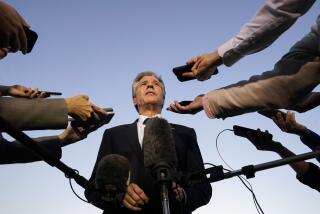The Arab Tide Turns Against Bin Laden
- Share via
While the world awaits a determination of Osama bin Laden’s fate, many Arabs and Muslims are coming to terms with his destructive legacy. Whether he is found dead or alive, he is unlikely to be viewed as a hero or a martyr.
The decisive military defeat handed to Bin Laden in Afghanistan has discredited him in the eyes of most Arabs and has shattered his well-constructed image as a holy warrior. He has lost the battle for the hearts and minds of the “floating middle” of Muslim public opinion.
Even those Arab multitudes who initially flirted with Bin Ladenism out of anger with the United States have now discovered that his inflated rhetoric was more thin air than real. Not only did he not put up a credible fight against the anti-Taliban forces and their U.S. allies, but he lured thousands of deluded foot soldiers into a deathtrap in Afghanistan.
People in that part of the world are fed up with losers, who often abuse their political naivete and who promise them the world only to bring defeat and death in the end. Bin Laden’s raw tribalism rings true in Arab ears: “When people see a strong horse and a weak horse, by nature they will like the strong horse.”
Bin Laden proved to be less a strong horse than a paper tiger.
As the dust settles on the field of battle in Afghanistan, Arabs are recognizing the incalculable damage wrought by Bin Laden. With the exception of a few naive souls intoxicated by the culture of martyrdom, support for Bin Laden and his ilk appears to have evaporated quicker than expected. Instead of seeing him as living up to his claims of advancing the cause of Islam, Arab commentators accuse him of hijacking a peaceful religion and making it, in the eyes of many Westerners, synonymous with terrorism. They also blame him for undermining the Palestinian cause.
Equally important, Bin Laden’s defiance and subsequent defeat will also deepen the sense of Arab victimization and encourage Middle Eastern regimes to suspend political reforms and crack down harder on opponents.
Bin Laden had hoped that by killing thousands of innocent Americans he could make the U.S. lash out angrily and murderously against Muslims, thus precipitating a clash of civilizations. But the Bush administration did not play into his hands, and the Muslim community did not rise up. Although surveys showed that 40% of Arabs sympathized with Bin Laden’s criticism of the U.S. and the pro-Western regimes it supports, they rejected his terrorist methods.
Do not be misled by the noisy cheerleading for Bin Laden in some Islamist quarters. Most Arabs and Muslims do not subscribe to Bin Laden’s apocalyptic nightmare and see through his inflammatory rhetoric. It was only the majority’s apathy that enabled the activist pro-Bin Laden camp to misinform, propagandize and distort political sensibilities in the Muslim arena.
However, Bin Laden’s loss of the propaganda war does not imply that the United States has won. Poll results show that anti-American sentiment is a staple of Arab politics. Today, to be politically conscious in the Arab world is to be highly suspicious of the United States, its foreign policies, values and institutions. In the eyes of many Arabs and Muslims, Bin Laden or no Bin Laden, the United States has become a scapegoat for the ills and misfortunes that befell their world in the second half of the last century.
Bin Ladenism taps into the Arab sense of victimization and the deep reservoir of accumulated grievances against the United States. With the Taliban vanquished and the Al Qaeda network in Afghanistan destroyed, the challenge facing the U.S. is to tackle the deepening anti-Americanism in the region by reassessing the efficacy and fairness of its foreign policies.
Yet there are limits to what U.S. policymakers can do to reduce social discontent in the world of Islam. Arabs and Muslims must take charge of their political destiny by seizing the initiative from Bin Ladenism and charting a new liberal, humanist path. Blaming the other--the West--is an easy escape from addressing the real conditions that give rise to and sustain backwardness, underdevelopment, extremism and intolerance.
Will the defeat of Bin Ladenism serve as a catalyst for the Arabs to rise to the challenge and fully join modernity?
More to Read
Sign up for Essential California
The most important California stories and recommendations in your inbox every morning.
You may occasionally receive promotional content from the Los Angeles Times.










